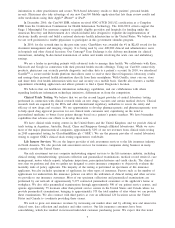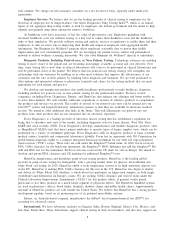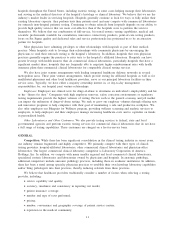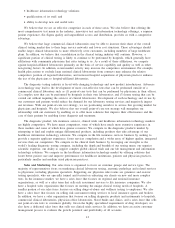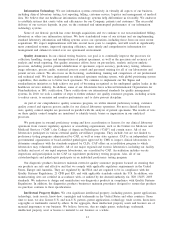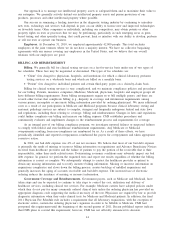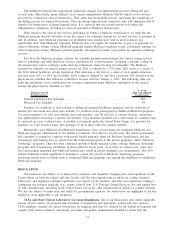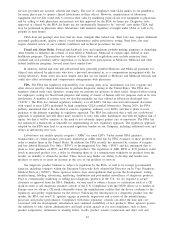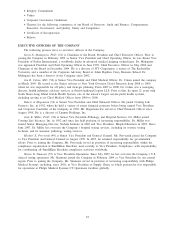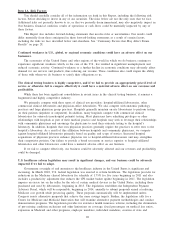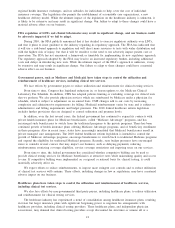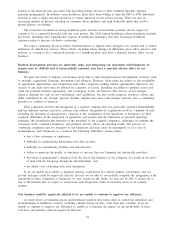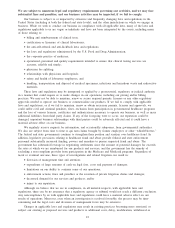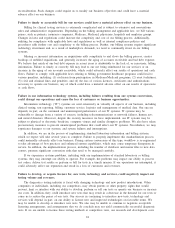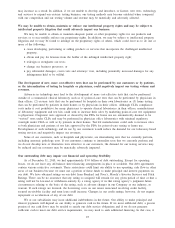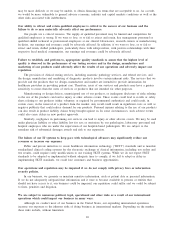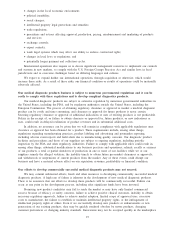Quest Diagnostics 2010 Annual Report Download - page 20
Download and view the complete annual report
Please find page 20 of the 2010 Quest Diagnostics annual report below. You can navigate through the pages in the report by either clicking on the pages listed below, or by using the keyword search tool below to find specific information within the annual report.criminal sanctions. Where appropriate, voluntary compliance actions, such as voluntary recalls, may be
undertaken.
Environmental, Health and Safety. We are subject to laws and regulations related to the protection of the
environment, the health and safety of employees and the handling, transportation and disposal of medical
specimens, infectious and hazardous waste and radioactive materials. For example, the U.S. Occupational Safety
and Health Administration (“OSHA”) has established extensive requirements relating specifically to workplace
safety for healthcare employers in the U.S. This includes requirements to develop and implement multi-faceted
programs to protect workers from exposure to blood-borne pathogens, such as HIV and hepatitis B and C,
including preventing or minimizing any exposure through needle stick injuries. For purposes of transportation,
some biological materials and laboratory supplies are classified as hazardous materials and are subject to
regulation by one or more of the following agencies: the U.S. Department of Transportation, the U.S. Public
Health Service, the United States Postal Service and the International Air Transport Association. We generally
use third-party vendors to dispose of regulated medical waste, hazardous waste and radioactive materials and
contractually require them to comply with applicable laws and regulations.
Physicians. Many of our pathologists enter into an employment agreement. These agreements have varying
terms, but generally can be terminated at any time, upon advance notice. Most of the agreements contain
covenants generally limiting the activities of the pathologist within a defined geographic area for a limited period
of time after termination of employment. The agreements may be subject to limitations under state law that may
limit the enforceability of these covenants.
Our pathologists are required to hold a valid license to practice medicine in the jurisdiction in which they
practice. If they provide inpatient services, they must become a member of the medical staff at the relevant
hospital, with privileges in pathology.
Several states, including some in which our businesses are located, prohibit business corporations from
engaging in the practice of medicine. In certain states, business corporations are prohibited from employing
licensed healthcare professionals to provide services on behalf of the corporation; these laws vary from state to
state. The manner in which licensed physicians can be organized to perform medical services may be governed
by the laws of the state in which medical services are provided and by the medical boards or other entities
authorized by these states to oversee the practice of medicine. In some states, anatomic pathology services are
delivered through physician-owned entities that employ the practicing pathologists.
Privacy and Security of Health and Personal Information. We are required to comply with laws and
regulations in the United States (at the federal and state levels) and jurisdictions outside the United States in
which we conduct business, including the European Union, regarding protecting the security and privacy of
certain healthcare and personal information. These privacy and security laws include the federal Health Insurance
Portability and Accountability Act, as amended, and the regulations thereunder (collectively, “HIPAA”). The
HIPAA security regulations establish requirements for safeguarding electronic protected health information. The
HIPAA privacy regulations establish comprehensive federal standards regarding the uses and disclosures of
protected health information. Together, these laws and regulations establish a complex regulatory framework on a
variety of subjects, provide for penalties for non-compliance, and may require a healthcare provider to notify
patients or the government if the provider discovers certain breaches of unsecured personal or a patient’s
protected health information. We have implemented practices to meet applicable requirements.
Drug Testing; Controlled Substances. All U.S. laboratories that perform drug testing for public sector
employees and employees of certain federally regulated businesses are required to be certified as meeting the
detailed performance and quality standards of the Substance Abuse and Mental Health Services Administration.
To obtain access to controlled substances used to perform drugs-of-abuse testing in the United States, laboratories
must be licensed by the Drug Enforcement Administration. All of our laboratories that perform such testing or
that utilize controlled substances are so certified or so licensed, respectively.
Compliance. We seek to conduct our business in compliance with all applicable laws and regulations. Many
of the laws and regulations applicable to us, however, including many of those relating to billing, reimbursement
of tests and relationships with physicians and hospitals, are vague or indefinite or have not been interpreted by
the courts. They may be interpreted or applied by a prosecutorial, regulatory or judicial authority in a manner
that could require us to make changes in our operations, including our pricing and/or billing practices. The
applicability or interpretation of laws and regulations also may not be clear in light of emerging changes in
clinical testing science and healthcare technology. Such occurrences, regardless of their outcome, could, among
other things:
17


